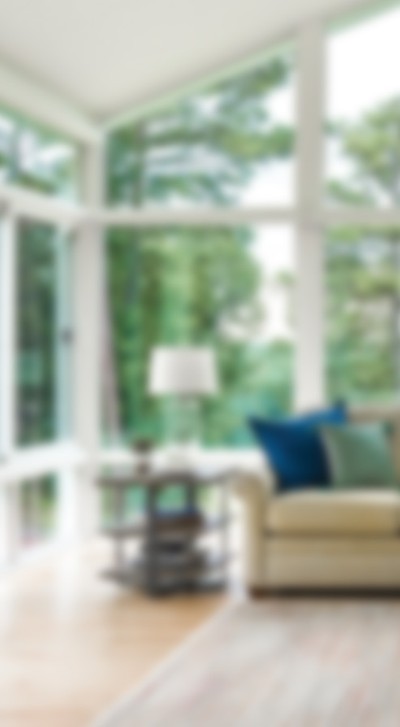


Expert Overview
- Who you hire to construct and install your sunroom is one of the most important decisions you’ll make about your sunroom.
- Sunrooms vary in materials, window types, and types of roofs. These things all affect the sunroom price.
- With the right planning upfront, your sunroom can be exactly what you want it to be, from climate control to functionality.
Adding a sunroom to a home is a major project. As you begin to plan this home upgrade, there are many things to keep in mind.
Champion has been installing sunrooms in some fashion since the 1950s. Not only are we experts on sunrooms as a product, we’ve coached thousands of homeowners through the process of adding one. In fact, from permitting to install, we handle every part of adding on a sunroom. So we know some of the big questions homeowners have—as well as some of the finer points that aren’t as obvious.
1. Sunrooms aren’t generally a DIY product.
While a sunroom addition is relatively simple when compared to other standard room additions, sunroom installation is still a major structural change to the home. This is why most homeowners should not try to build their own sunroom.
There are exceptions, especially for homeowners who work in the trade. But in general, an inexperienced homeowner who builds their own sunroom could unknowingly cause leaks, drainage problems, heating and cooling issues and poor efficiency. Only an experienced contractor with a knowledge of the materials, local building codes and best practices in construction can add a proper sunroom without compromising the structure of the home.
2. Working with a company that specializes in sunrooms, versus a general contractor, makes a difference.
Sunroom installers who specialize in the installation of sunrooms know a great deal about the pitfalls of sunroom installation and how to avoid these problems. General contractors who do not specialize in this type of construction may have less expertise and may be more likely to run into problems during the project.
3. Before hiring your sunroom contractor, ask for references.
Never hire a sunroom contractor who has no references. Good references help prove that a contractor is trustworthy and skilled in the trade. Look for a contractor who has a long history of providing quality products, can provide testimony from satisfied customers and who has a clean record with the state licensure board and other organizations. Also, remember that a good contractor will also supply a comprehensive contract that fully details the role of the contractor and expectations for the homeowner.
4. Not all sunrooms are made from the same materials.
The materials most commonly used for framing a sunroom are:
- Aluminum: Durable and weather resistant, aluminum is also easy to manipulate, so it can form a variety of different shapes.
- Vinyl: Unlike aluminum, vinyl comes in different colors, so homeowners can pick the color that they prefer. It’s also flexible, energy efficient and easy to maintain.
- Wood: A popular choice in high-end homes because of its unparalleled beauty and warmth, wood is higher maintenance. Wood must be constructed with quality fasteners, and the room itself must have excellent humidity control. Without proper care, a wooden sunroom can be at risk for deterioration from moisture or exposure to sunlight.
5. Unexpected issues can arise when building your sunroom.
Any time a contractor cuts into a home, removes a wall or makes a major structural change, there's always a risk that they will discover water damage, leaks and mold. Any rot in the wood or mold in the walls must be repaired before the construction can continue.
Also, homeowners who choose to work with a contractor who is not reputable may face other challenges. Delays in construction, poor quality workmanship, poor quality materials and miscommunications are common problems that homeowners encounter when using sub-par contractors. The best way to avoid this problem is to work with a contractor who is reputable, known for quality and good with customers.
6. Sunroom costs estimates vary.
Size, materials, sunroom type, location of the home, contractor rates, age and condition of the home can all influence the cost. Prefabricated structures are far less costly than custom sunrooms, but offer less value as well. While average screen room pricing starts around $25,000, a more standard sunroom, rooms with fully enclosed glass, could range all the way up to $178,000. The best way to find out how much a sunroom will cost is to get estimates from a contractor. At Champion, we have sunroom options for a variety of budgets, and often run promotions on sunrooms.
7. If you do it right, adding a sunroom can improve the value of the home.
If you are selling your home, you should be able to recoup some or most of your investment, because all-season sunrooms count as square footage, which increases the value of your home. That is, if your sunroom is installed properly by a reputable contractor with knowledge of local building codes.
8. It’s entirely possible to heat and cool your sunroom.
Because they are made of glass, you may assume that sunrooms are hard to heat in the winter and difficult to keep cool in the summer. But sunrooms can be just as comfortable as the rest of the house, with proper planning and good energy efficiency. Explore adding a ceiling fan and an HVAC unit to keep your room pleasant year round.
9. The type of windows you use can make a difference in energy efficiency.
Glass walls and doors can get cold in the winter, unless the windows themselves are energy efficient. Homeowners who use double pane glass with Low-E coating are less likely to notice a temperature drop in the sunroom during the winter months. In general, a sunroom that is well-installed, properly ventilated and made of quality materials should not have a serious problem with condensation.
10. You don’t have to have a glass roof on your sunroom.
On some types of sunrooms (solariums, for example), the roof is made of glass, which can bring delight to stargazers and sun lovers alike. However, you may not want quite that much sun exposure. Engineered roofing panels can provide protection from the sun.
11. You can have operable windows on sunrooms.
A sunroom is made up of windows... but they don’t always open. However, you can have working windows if you want. Just make sure to work with a licensed contractor who can address this in the sunroom plans. Later on in this guide, we discuss the most common types of windows found in a sunroom.
12. You can wire your sunroom to have power.
Homeowners who want their sunroom to have electricity can work with their contractor to make sure the power gets run correctly.
